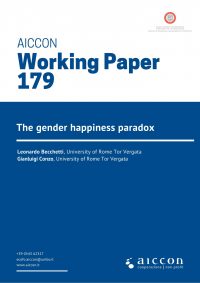179 – The gender happiness paradox
Abstract
According to the gender happiness paradox women are signi ficantly more likely to declare high levels of life satisfaction than men after controlling for all relevant socio- demographic factors, but also signi cantly more likely to declare they are depressed.
We find that the paradox holds in the cross-country sample of the European Social Survey and is stable across age, education, self-assessed health, macroregion and survey round splits.
We fi nd support for the affect intensity rationale showing that women are relatively less resilient (less likely to revert to their standard levels of happiness after a shock) and affected relatively more in their life satisfaction by the good or bad events or achievements occurring during their lives. We as well discuss cultural factors that can explain our nding.
Keywords: gender happiness paradox, subjective wellbeing.
JEL Codes: I30, I31.

